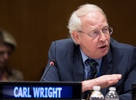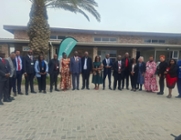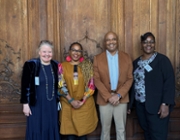From goals to actions, localising the new SDGs

20 October 2015
More than 150 world leaders came together at the United Nations Sustainable Development Summit on 25 September in New York to adopt the 2030 Agenda for Sustainable Development including the new Sustainable Development Goals (SDGs) – a set of universal goals, applying to countries at all stages of development. The 17 new SDGs, also known as the Global Goals, aim to end poverty, hunger and inequality, take action on climate change and the environment, improve access to health and education, build strong institutions and partnerships, and more.
The 2030 Agenda for Sustainable Development is a product of unprecedented global consultation and dialogue, in which local and regional governments have actively participated. CLGF, with key international partners, has played a direct role in shaping the new SDGs and the implementation of the 2030 Agenda, including developing the concepts of localising the SDGs and localising resources. The Global Taskforce of Local and Regional Governments for Post-2015 Development Agenda towards Habitat III (GTF) in which CLGF is a leading partner, has been engaged throughout the UN consultations which have been pivotal in ensuring that local government’s voice is heard and there is a clear commitment to localisation.
CLGF’s 2015 conference in Gaborone, Botswana took place at a very opportune time to look at the next steps forward and agreed Vision 2030 for how local government can play a full part in the multi-level, multi-stakeholder approach to development and tackling poverty. Speaking at the 2015 Commonwealth Local Government Conference in Gaborone, Botswana in June, CLGF Chairperson Mayor Lawrence Yule said, “It is important to recognise the interconnectedness of economic development at the global, regional, national and local levels and to ensure that local government’s role is mainstreamed into all levels of planning and operations. For local government to play a full role in supporting the achievements of national and global development targets such as the SDGs, it is essential that adequate resources and powers to access own-source revenue are devolved to the local," he said.
CLGF’s strong advocacy role has been successful - the 2030 Agenda gives explicit recognition to the role of local and sub-national government, both in respect of specific SDGs, such as SDG16 on building effective, accountable and inclusive institutions at all levels; SDG11 on inclusive, safe, resilient and sustainable cities and human settlements, and in the provisions relating to the implementation, follow-up and review of the SDGs; as well as the Addis Ababa Action Agenda, the outcome statement of the third International Conference on Financing for Development in July in Addis Ababa, Ethiopia acknowledges the need for scaling up the financing to strengthen capacities of municipalities and other local authorities.
With the 2030 Agenda due to come into effect in January 2016, it is vital for local and regional governments to have access to information on why the SDGs matter to them. One of the most significant and successful initiatives of CLGF has been tirelessly pushing for all goals to take into account local challenges and opportunities at all stages of the process, from setting of goals and targets, to the means of implementation, the indicators used to monitor progress and the structure and mechanism of the new global partnership for sustainable development.
CLGF’s efforts have been rewarded with world leaders acknowledging the need for local governments and their associations to be strengthened in order for them to fully engage in the implementation process, as the challenges faced are universal and need to be addressed together by all territories big and small and in all countries, including Small Island Developing States (SIDS). This has led to growing acceptance of the bottom-up approach to development and emphasis on the localisation of the implementation of the SDGs.
There is much that local governments are already doing in many areas covered by the SDGs and this experience and know-how will now need to be linked into the new 2030 strategy. In line with the recommendations of the Gaborone Declaration - Local Government Vision 2030, CLGF is working towards developing a 15 year strategy for local government, supporting its members to facilitate national and provincial dialogue to discuss ways in which they can work together to implement the 2030 Agenda, noting that the new SDGs to apply to all countries everywhere, developed as well as developing, small and large.
The next big event in the local and regional government calendar - the Habitat III Conference in Quito in October 2016 will not only be the first UN Global conference to be held after the adoption of SDGs but will also be an opportunity to make a qualitative leap forward in the relationship between the UN and the local governments. It will focus on how to implement urbanisation, defining the new urban agenda for the international community. CLGF as part of the Global Taskforce will be calling on UN to officially acknowledge local authorities as full partners in the Habitat Agenda and to give local and regional government networks a more direct role and increased responsibilities within the governing bodies of UN-Habitat.
Back to News





